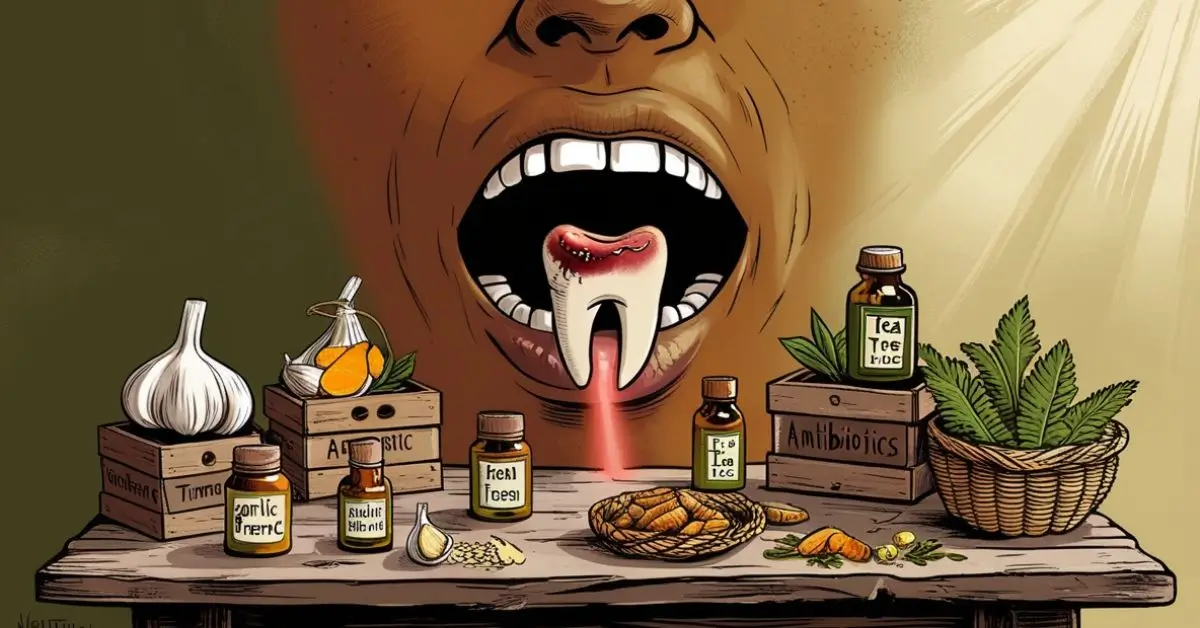Tooth infections can be painful and disruptive, often requiring swift treatment. While synthetic antibiotics are a common choice, natural alternatives are gaining popularity for their efficacy and fewer side effects. This article explores the strongest natural antibiotics for tooth infections, compares their benefits, and provides practical guidance.
Understanding Tooth Infections
Tooth infections occur when harmful bacteria invade the pulp or surrounding gum tissue. Symptoms include swelling, severe pain, sensitivity, and sometimes fever. Left untreated, infections can spread, causing serious complications. Natural antibiotics can help manage mild infections or complement professional dental care.
Top Natural Antibiotics for Tooth Infections
1. Garlic
Garlic contains allicin, a compound with potent antibacterial and anti-inflammatory properties. Research supports its ability to combat oral pathogens effectively. Crushing fresh garlic and applying it to the infected area can help reduce bacterial load.
2. Clove Oil
Clove oil’s primary active compound, eugenol, is known for its analgesic and antibacterial properties. It provides immediate pain relief and fights bacteria. Applying diluted clove oil directly to the infected area is a popular remedy.
3. Turmeric
This golden spice contains curcumin, a natural anti-inflammatory and antibacterial agent. A turmeric paste, made with water or coconut oil, can be applied to the infected tooth or gums for relief.
4. Tea Tree Oil
Tea tree oil has strong antimicrobial properties. Diluting a few drops in water and using it as a mouthwash can help reduce bacteria.
5. Propolis
A resinous substance produced by bees, propolis is effective in inhibiting bacterial growth related to dental infections. It also aids in healing and reducing inflammation.
6. Saltwater Rinse
While not strictly an antibiotic, saltwater helps cleanse the mouth, reduce inflammation, and draw out pus from abscesses.
Comparison of Natural Antibiotics
| Natural Antibiotic | Active Compound | Benefits | Application Method | Best For |
|---|---|---|---|---|
| Garlic | Allicin | Antibacterial, anti-inflammatory | Crushed and applied to the affected area | Bacterial infections |
| Clove Oil | Eugenol | Pain relief, antibacterial | Diluted and applied with a cotton swab | Immediate pain relief |
| Turmeric | Curcumin | Anti-inflammatory, antibacterial | Applied as a paste | Swollen or inflamed gums |
| Tea Tree Oil | Terpinen-4-ol | Antimicrobial, soothing | Used as a diluted mouthwash | Broad-spectrum antibacterial |
| Propolis | Various bioactive compounds | Healing, antibacterial | Applied directly or as an oral spray | Promoting recovery |
| Saltwater | Sodium chloride | Cleansing, anti-inflammatory | Used as a rinse | Drawing out abscess pus |
Scientific Backing for Natural Remedies
Studies highlight the antibacterial efficacy of these remedies:
- Garlic: Proven to inhibit Streptococcus mutans, a common oral bacterium.
- Tea Tree Oil: Demonstrates significant antimicrobial activity against bacteria causing dental infections.
- Propolis: Known to disrupt bacterial growth, especially in resistant strains.
Advantages of Natural Antibiotics
- Fewer Side Effects: Unlike synthetic antibiotics, natural options are gentler on the body.
- Low Resistance Risk: Bacteria are less likely to develop resistance.
- Cost-Effective: Many natural remedies are affordable and accessible.
- Additional Health Benefits: Many options, like turmeric and garlic, boost overall immunity.
Precautions
- Always dilute potent substances like clove and tea tree oil to avoid irritation.
- Limit the application of strong remedies like garlic to prevent burns.
- Seek professional dental care for severe or persistent infections.
When to See a Dentist
Natural antibiotics are effective for minor infections. However, visit a dentist if you experience:
- Fever or severe swelling.
- Persistent pain despite treatment.
- Difficulty swallowing or breathing.
Supplementary Resources
Watch this informative YouTube video on natural remedies for tooth infections to better understand their preparation and usage.
Conclusion
The strongest natural antibiotics for tooth infections include garlic, clove oil, turmeric, and more. While effective for mild cases, they should complement, not replace, professional dental care for severe infections. By using these remedies wisely, you can manage tooth infections naturally and safely.












